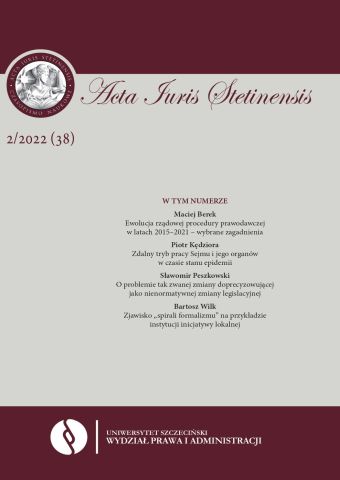Rola wykładni i jej wpływ na orzecznictwo na przykładzie ulgi meldunkowej
The role of interpretation and its influence on jurisprudence – the example of residency relief
Author(s): Wiktor Gnych-PietrzakSubject(s): Politics / Political Sciences, Law, Constitution, Jurisprudence, Civil Society, Commercial Law, Administrative Law
Published by: Wydawnictwo Naukowe Uniwersytetu Szczecińskiego
Keywords: legal interpretation; residency relief; tax law; in dubio pro tributario
Summary/Abstract: The main objectives of the conducted research concern the consequences for the taxpayer, which arise from the rulings of the administrative courts adopting different types of interpretation in relation to the exemption from income tax on natural persons called the residence relief. The first research objective is to verify whether, among the prerequisites required to obtain the exemption, the mere fulfilment of the material condition enables to obtain the exemption from this tax. The second research objective concerned the duties of tax authorities, relating to the general principles of tax proceedings and resolving doubts as to the factual and legal status in favour of the taxpayer, as well as control of fulfilment of the material condition of the residency relief by obtaining information from teleinformatic systems. The research objectives defined in this way allowed to put forward the main research thesis, which indicates that the choice of interpretation (from among linguistic, systemic, and functional) by the adjudicating panels in the scope of the residency relief affects the application of law and produces different legal effects for the taxpayer. The conducted research allowed also to identify the second (supplementary) research thesis, according to which the tax authorities should apply the principle in dubio pro tributario in cases concerning the residency relief and additionally use the available information and communication systems in order to correctly establish the facts. A dogmatic-legal, analytical, and empirical method were used to conduct the research. Relevant legal regulations and literature were analysed. Additionally, an empirical analysis of the jurisprudence of administrative courts and the Constitutional Tribunal was used. The study was concluded as follows. The descriptive layer of the legal text requires the fulfilment of a formal condition, however, for the correct decoding and application of a legal norm, also a systemic and functional interpretation should be applied due to the lack of clear rules regarding this condition. Moreover, the tax authorities, during tax proceedings, are obliged to resolve doubts in favour of the taxpayer and should cooperate with the taxpayer in order to clarify the doubts concerning fulfilment of the formal condition for the registration allowance, in particular through the use of teleinformatic systems.
Journal: Acta Iuris Stetinensis
- Issue Year: 2022
- Issue No: 38 (2)
- Page Range: 93-108
- Page Count: 16
- Language: Polish

